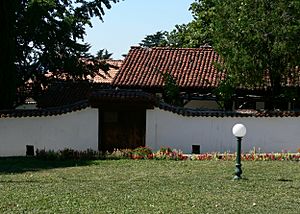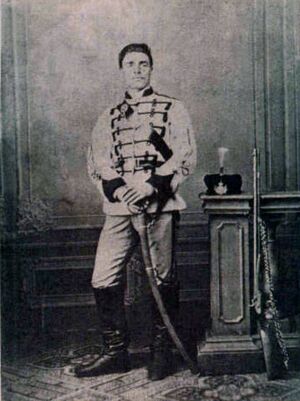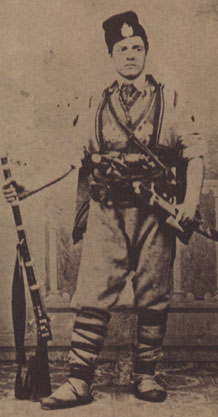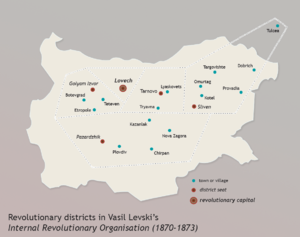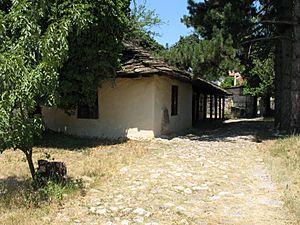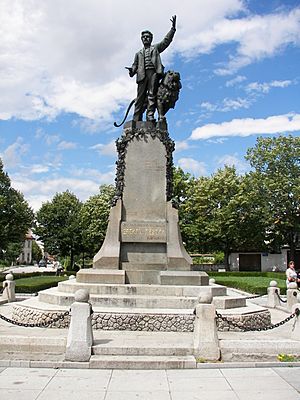Vasil Levski facts for kids
Quick facts for kids
Vasil Levski
|
|
|---|---|
| Васил Левски | |
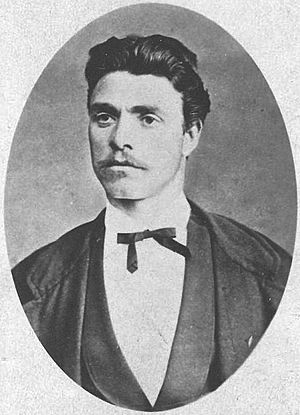 |
|
| Born |
Vasil Ivanov Kunchev
18 July 1837 Karlovo, Eyalet of Adrianople, Ottoman Empire (today Bulgaria)
|
| Died | 18 February 1873 (aged 35) |
| Cause of death | Execution by hanging |
| Resting place | Sofia, Bulgaria |
| Occupation | Revolutionary |
| Known for | Internal Revolutionary Organisation |
| Signature | |
 |
|
Vasil Levski (Bulgarian: Васил Левски) was born Vasil Ivanov Kunchev on 18 July 1837. He died on 18 February 1873. He was a brave revolutionary from Bulgaria. Today, he is a great national hero in his country. People called him the Apostle of Freedom. Levski had a big plan to free Bulgaria from the rule of the Ottoman Empire.
He created a group called the Internal Revolutionary Organisation. His goal was to start a country-wide uprising using a network of secret groups. Levski was born in Karlovo to a middle-class family. He first became an Orthodox monk. Later, he joined Bulgarian revolutionary groups in Serbia. There, he earned the nickname Levski, which means "Lionlike".
After teaching in Bulgaria, he shared his ideas. He developed a new plan for a revolutionary group based inside Bulgaria. This was different from older plans that used groups from outside the country. In Romania, Levski helped start the Bulgarian Revolutionary Central Committee. This group was made of Bulgarians living abroad. Levski traveled across Bulgaria, setting up many secret committees. But Ottoman officials caught him near Lovech. They executed him by hanging in Sofia.
Levski dreamed of a free Bulgarian republic. He wanted everyone to be equal, no matter their background or religion. This idea was like the French Revolution and modern Western ideas. He believed that all groups, including Bulgarians, Turks, and Jews, should have equal rights. He is remembered with many monuments in Bulgaria and Serbia. Many places and groups are named after him. In 2007, he was voted the greatest Bulgarian of all time in a TV poll.
Contents
Why Bulgaria Needed a Hero
The Ottoman Empire ruled Bulgaria for a long time. In the 1800s, the empire was facing many problems. It was often called the "sick man of Europe." Reforms planned by the sultans were hard to achieve.
The Rise of Bulgarian Spirit
During the mid-1800s, Bulgarians started to feel a stronger sense of national pride.
- Bulgarian merchants and craftsmen became more successful.
- People started building schools funded by Bulgarians.
- Bulgarians fought for their own independent Church.
- They also began to work towards creating a separate Bulgarian state.
Other countries like Serbia and Greece had already gained some freedom. However, not everyone agreed on fighting the Ottomans. Many farmers and rich traders worried that a revolt would cause problems for their businesses and land. Revolutionary ideas were mostly popular among educated people in cities.
Vasil Levski's Life Story
Early Years and Becoming a Monk
Vasil Ivanov Kunchev was born on 18 July 1837 in Karlovo. This town was part of the Ottoman Empire. His parents, Ivan and Gina Kunchev, were from a family of priests and craftsmen. They were part of the growing middle class in Bulgaria. Vasil's father died in 1844. Vasil had two younger brothers, Hristo and Petar, and an older sister, Yana.
A fellow revolutionary, Panayot Hitov, described Levski as being of medium height. He was agile and strong. He had light, greyish-blue eyes and blond hair. Levski did not smoke or drink. Other people who knew him agreed with this description.
Levski started school in Karlovo. He also learned tailoring. In 1855, his uncle Basil, who was a high-ranking monk, took him to Stara Zagora. Levski went to school there and worked for his uncle. Later, he joined a course to become a priest. On 7 December 1858, he became an Orthodox monk. He took the name Ignatius. In 1859, he became a hierodeacon. This is why one of his nicknames was The Deacon.
Joining the Fight for Freedom
In the spring of 1862, Levski was inspired by Georgi Sava Rakovski's ideas. He went to Belgrade, the capital of Serbia. Rakovski was putting together the First Bulgarian Legion there. This was a group of Bulgarian volunteers who wanted to overthrow Ottoman rule. Levski left his life as a monk and joined the Legion.
At that time, there was tension between the Serbs and the Ottomans. Levski and the Legion fought bravely in the Battle of Belgrade. They helped push back the Turkish forces. The conflicts ended peacefully, and the First Bulgarian Legion was disbanded in September 1862. Levski's bravery during training and fighting earned him the nickname Levski, meaning "Lionlike."
After the Legion was disbanded, Levski joined another group. But he soon returned to Rakovski in Belgrade. In the spring of 1863, Levski went back to Bulgaria. His uncle reported him to the Ottoman authorities. Levski was put in prison in Plovdiv for three months. He was released with help from a doctor and the Russian vice-consul.
On Easter 1864, Levski officially stopped being a monk. From May 1864 to March 1866, he worked as a teacher in Voynyagovo. While there, he helped Bulgarians who were being persecuted. He also organized patriotic groups. The Ottoman authorities became suspicious, so he had to move. From 1866 to 1867, he taught in two villages near Tulcea.
More Revolutionary Work
In November 1866, Levski visited Rakovski in Iaşi. Two revolutionary groups were encouraging Bulgarians living in Romania to invade Bulgaria. They wanted to start a fight against the Ottomans. Rakovski suggested that Vasil Levski become the standard-bearer for Panayot Hitov's group. In April 1867, the group crossed the Danube River. They moved through the Ludogorie region and reached the Balkan Mountains. After some fighting, the group went to Serbia in August.
In Serbia, the government was friendly to the Bulgarian revolutionaries. They allowed them to create the Second Bulgarian Legion in Belgrade. Levski was an important member of this group. However, from February to April 1868, he had stomach problems and needed surgery. He could not take part in the Legion's training. When the Legion was disbanded again, Levski tried to join his friends. But he was arrested in Zaječar and briefly imprisoned.
After his release, he went to Romania. There, Hadzhi Dimitar and Stefan Karadzha were gathering revolutionary groups. Levski did not join them for different reasons, including his health. In the winter of 1868, he met the poet and revolutionary Hristo Botev. They lived together in an old windmill near Bucharest.
Building a Network in Bulgaria
Levski believed that the revolution should be prepared inside Bulgaria. He thought that groups based outside the country were not the best way. So, he made his first trip to Bulgaria to talk to all kinds of Bulgarians. He wanted to get them ready for a successful revolution.
On 11 December 1868, he traveled by ship from Turnu Măgurele to Istanbul. This was the start of a trip that lasted until 24 February 1869. During this trip, Levski visited many towns like Plovdiv, Karlovo, and Lovech. He made connections with local patriots.
After two months in Bucharest, Levski returned to Bulgaria for a second trip. This trip lasted from 1 May to 26 August 1869. He carried messages printed in Romania. These messages said that Levski was a representative of a Bulgarian provisional government. He traveled to many towns, including Nikopol, Pleven, and Stara Zagora. Some historians believe he started his first secret committees during this trip.
From August 1869 to May 1870, Levski was active in Bucharest. He worked with the writer Lyuben Karavelov. Karavelov's writings brought many people together. They started the Bulgarian Revolutionary Central Committee (BRCC). This was a main group for Bulgarians living abroad. Levski was a founding member. He disagreed with some of their plans, so he left Bucharest in the spring of 1870. He then started to build his own revolutionary network inside Bulgaria.
The Internal Revolutionary Organisation
Levski spent a year and a half setting up a large network of secret committees. These were in Bulgarian cities and villages. This network was called the Internal Revolutionary Organisation (IRO). Its main center was the Lovech Central Committee. This committee was also known as the "BRCC in Bulgaria." The goal of these committees was to get ready for a planned uprising.
The IRO network was strongest in central Bulgaria, especially around Sofia and Plovdiv. Committees were also set up in parts of Macedonia and Dobruja. The IRO committees bought weapons and organized groups of volunteers. One study says the group had over 1,000 members in the early 1870s. Most members were educated people and traders.
People joined the IRO in secret. The joining ceremony involved taking an oath of allegiance on the Gospel or a Christian cross, a gun, and a knife. If someone betrayed the group, they could be punished by death. Secret police watched what each member did. The group used encryption and fake names to communicate. Levski led the organization, but he had assistants like Matey Preobrazhenski and Angel Kanchev.
Many stories, some legendary, are told about Levski and the IRO. Ottoman authorities offered money for his death or capture. Levski used disguises to avoid being caught. He dyed his hair and wore different national costumes. In 1871, Levski and Angel Kanchev wrote a draft plan for the BRCC. It included ideas about the revolution, how the group should be organized, and rules. Levski's letters from 1871 to 1872 show how much his ideas about the revolution had grown.
As the IRO grew, it worked more closely with the BRCC in Bucharest. Levski suggested a big meeting from 29 April to 4 May 1872. At this meeting, they approved a plan and rules. They chose Lyuben Karavelov as the leader. Levski was made the only official representative of the BRCC in Bulgaria. After the meeting, Levski went back to Bulgaria. He reorganized the IRO based on the BRCC's ideas. However, the group faced problems because they didn't have enough money. Levski's decisions were also questioned more often.
Capture and Execution
Levski's assistant, Dimitar Obshti, robbed an Ottoman postal convoy on 22 September 1872. He did this without permission from Levski or the leaders. The robbery was successful, and the IRO got a lot of money. But Obshti and the others were soon arrested. During the investigation, they revealed the size of the revolutionary group. They also showed its close ties to the BRCC. Obshti and other prisoners confessed everything. They also revealed Levski's important role.
Levski realized he was in danger. He decided to escape to Romania to meet Karavelov. But first, he needed to get important documents from the committee's archive in Lovech. These documents would be dangerous if the Ottomans found them. He stayed at an inn in Kakrina. On the morning of 27 December 1872, he was surprised and arrested. Many believe a priest named Krastyo Nikiforov betrayed Levski. However, some researchers disagree due to a lack of clear evidence.
Levski was first taken to Tarnovo for questioning. Then, on 4 January, he was sent to Sofia for trial. He admitted who he was. But he did not reveal his helpers or details about his group. He took all the blame himself. The Ottoman authorities sentenced Levski to death by hanging. He was executed on 18 February 1873 in Sofia. The Monument to Vasil Levski now stands at that spot. We don't know exactly where Levski is buried.
Levski's death caused a big crisis in the Bulgarian revolutionary movement. Most IRO committees soon fell apart. However, five years after Levski's hanging, the Russo-Turkish War of 1877–1878 brought freedom to Bulgaria. This happened after the April Uprising of 1876. On 3 March 1878, the Treaty of San Stefano created the Bulgarian state. It became an independent Principality of Bulgaria under Ottoman rule in name only.
Levski's Big Ideas
In the late 1860s, Levski developed his revolutionary plan. He believed that all Bulgarians in the Ottoman Empire should rise up in an armed revolt. This uprising should be prepared and led by a central revolutionary group inside Bulgaria. This group would have local committees everywhere. It would work without any help from other countries.
Levski's idea came from the failures of earlier plans. These plans used armed groups from outside Bulgaria to start a revolt. Levski's idea of a completely independent revolution was not popular with everyone. In fact, he was the only major Bulgarian revolutionary who believed in it. Many people thought that powerful countries should intervene to help.
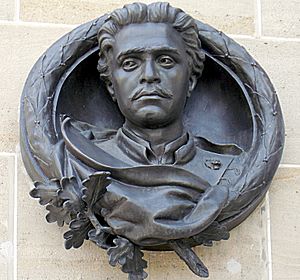
Levski imagined Bulgaria as a democratic republic. His ideas were similar to the Declaration of the Rights of Man and of the Citizen. They reflected the liberal ideas of the French Revolution and modern Western society. He said, "We will be free in complete liberty where the Bulgarian lives: in Bulgaria, Thrace, Macedonia; people of whatever ethnicity live in this heaven of ours, they will be equal in rights to the Bulgarian in everything. We will have a flag that says, 'Pure and sacred republic'..."
Levski believed that all religious and ethnic groups in a free Bulgaria should have equal rights. This included Bulgarians, Turks, Jews, and others. He made it clear that Bulgarian revolutionaries were fighting against the sultan's government. They were not fighting against the Turkish people or their religion. He said, "We're not driving away the Turkish people nor their faith, but the emperor and his laws... which has been ruling not only us, but the Turk himself in a barbarian way."
Levski was ready to give his life for the revolution. He put Bulgaria and its people before his own interests. He said, "If I shall win, I shall win for the entire people. If I shall lose, I shall lose only myself." He did not want to be a national leader or a high-ranking official in a free Bulgaria. He even said he would be happy to "graze the ducks" if it meant a free homeland. Like Giuseppe Garibaldi, Levski also planned to help other oppressed people around the world. He also believed in "strict and regular accounting" in his group. He did not allow corruption.
How Levski is Remembered
Vasil Levski is honored in many ways across Bulgaria. There are many monuments to him in cities and villages. Many streets are named after him. You can also find monuments to Levski outside Bulgaria. These are in places like Belgrade, Serbia, and Bucharest, Romania. There are three museums dedicated to Levski. One is in Karlovo, one in Lovech, and one in Kakrina. The Monument to Vasil Levski in Sofia stands where he was executed.
Several important places in Bulgaria are named after Vasil Levski. These include the football club Levski Sofia. There is also the Vasil Levski National Sports Academy. Bulgaria's national stadium is called Vasil Levski National Stadium. Levski's picture was on the 1000 Bulgarian leva banknote from 1994 to 1999. The town of Levski and six villages are also named after him. In Antarctica, a ridge and a peak on Livingston Island are named Levski Ridge and Levski Peak.
Vasil Levski's life has been a big part of Bulgarian literature and popular culture. The poet Hristo Botev wrote his last work, "The Hanging of Vasil Levski," about him. The writer Ivan Vazov also wrote a poem called "Levski." Levski has inspired works by many other writers. Songs about Levski are also found in the folk traditions of Macedonia. In February 2007, a TV show called Velikite Balgari ("The Great Bulgarians") asked people to vote for the greatest Bulgarian of all time. Vasil Levski won.
Some people have suggested that Vasil Levski should be made a saint by the Bulgarian Orthodox Church. However, historians say that while his life after being a monk was like a martyr's, it doesn't fit the Orthodox idea of sainthood. Levski's letters show that he threatened rich Bulgarians and traitors with death. He also supported taking money from the rich for the revolution. He also chose to leave his religious life to fight for freedom.
Vasil Levski's hanging is remembered every year in Bulgaria on 19 February. This is because of a mistake in calculating old calendar dates after Bulgaria started using the Gregorian calendar in 1916. We don't know where Levski is buried. But some of his hair is on display at the National Museum of Military History. Levski shaved his hair when he stopped being a monk. His mother and sister kept it. Levski's personal items are also in the military history museum. These include his silver Christian cross, his water vessel, his revolver, and the shackles from his imprisonment. His sabre is in the Lovech regional museum.
Vasil Levski is even mentioned in the video game Star Citizen. In the game, a future society called "The People's Alliance of Levski" follows his ideas. A pond in Plano, Texas, is also named in honor of Vasil Levski.
Images for kids
See also
 In Spanish: Vasil Levski para niños
In Spanish: Vasil Levski para niños
 | Leon Lynch |
 | Milton P. Webster |
 | Ferdinand Smith |


